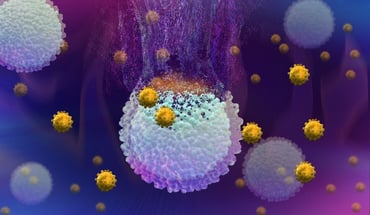
September is National Gynecologic Awareness Month -- a nationally recognized time established by the Foundation for Women’s Cancer in 1999. The month provides an opportunity to draw attention to the cancers that can develop in a woman’s reproductive system. Being informed is the first step you can take to help yourself and/or the other women in your life. Below are 5 facts you should know about gynecologic cancers that affect tens of thousands of women each year.
1. There are different types of gynecologic cancers.
Gynecologic cancer is a group of cancers that affect the tissue and organs of the female reproductive system. The five primary gynecologic cancers are:
Some of these cancers are divided into various subcategories, such as ovarian and uterine, that your gynecologic oncologist can explain further.
While each of these cancers is unique with different causes, risk factors, and treatment options, one thing they all have in common is that they are almost always treatable when caught early.
2. Gynecological cancer symptoms can be hard to recognize.
Each type of gynecologic cancer has different symptoms, some of which may be difficult to recognize. While it’s important to be familiar with the symptoms associated with gynecologic cancer, you should always pay attention to any abnormal signals your body may be giving you.
A broad list of common gynecologic symptoms you should be aware of include:
- Abnormal vaginal bleeding or discharge
- Pelvic pain
- Frequent or urgent bowel changes
- Bloating and/or feeling of fullness
- Pain during sexual intercourse
The American Cancer Society has additional information regarding specific symptoms related to ovarian cancer, cervical cancer, endometrial cancer, vulvar cancer, and vaginal cancer.
3. It’s more common than you may think.
Gynecologic cancers, in fact, are fairly common. According to the American Cancer Society, more than 110,000 women will be diagnosed with one of these diseases in 2018. Uterine cancer, also known as endometrial cancer, is the most common gynecologic cancer, followed by ovarian and cervical cancers. Out of the five, vulvar and vaginal cancers are the most rare. Knowing the signs, symptoms, and risk factors of gynecologic cancers can help reduce your risk and increase your chances of having gynecologic cancer detected early.
4. There are steps you can take for prevention.
Self-examinations and regular screening (Pap test) with a gynecologist can result in the detection of certain types of gynecologic cancers in their earlier stages, when treatment is most likely to be successful. For cervical cancer, which is typically caused by human papillomavirus (HPV), there is a vaccine you may wish to consider.
Diet, exercise, and lifestyle choices may also play a significant role in the prevention of not just gynecologic cancers, but other cancers as well. It can also help to have knowledge regarding your family medical history, which can play a role in whether or not you may get cancer.
5. All women are at risk.
All women are at risk for developing a gynecologic cancer, and the risk increases with age. This does not mean, however, that all women will develop one of these cancers. Some common risk factors known to increase a woman’s chance of developing a gynecologic cancer may include:
- Getting infected with HPV
- Long-term use of oral contraceptives (birth control pills)
- Eating a diet that is poor in nutrition
- Being overweight or obese
- Tobacco use
- Human immunodeficiency virus (HIV/AIDS) infection
- Exposure to diethylstilbestrol (DES), a synthetic estrogen given during pregnancy, prior to the year 1970, to prevent miscarriage
Other risk factors that cannot be controlled may include your age, race, and family history (genetics). The doctors in the Compass Oncology Genetic Risk Evaluation and Testing program are here to discuss your family history of cancer and whether your genetics may be a risk factor for gynecologic cancers.
During Gynecologic Cancer Awareness Month, as well as the rest of the year, we encourage all women to diligently seek more information and take action to help protect themselves against gynecologic cancers. By raising awareness, we can improve health outcomes for all women. To learn more, visit our Frequently Asked Questions Regarding Gynecologic Cancers page.



